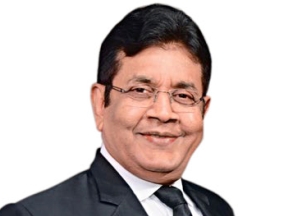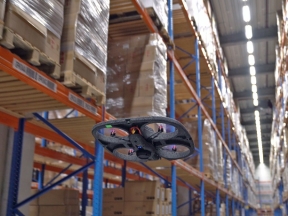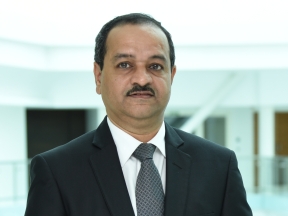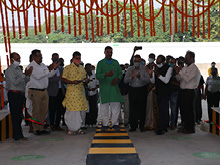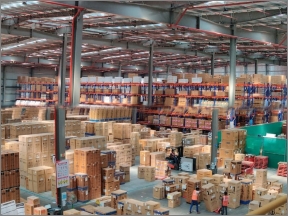With a primary focus on BBIN (Bangladesh, Bhutan, India & Nepal), V-Trans India has announced the commencement of its operations in SAARC countries on its 62nd foundation day. Initially, the service will primarily be focused on surface movement and will soon be covered with express and multimodal. On this M. K. Shah, MD, V-Trans says “This is one more milestone in our journey to become one of the most reliable and trusted players in the logistics business. The starting of our operations to SAARC countries is the beginning of a new chapter in the history of our company. We have been able to successfully manage the current scenario and looking forward to many more accomplishments in the near future. While the present times are challenging and tough, our team has gone all out and brought the best possible results, which are fully supported and integrated with the advanced technology and a collaborative approach.” One of the highlights for the company has been the successful management of the impact of the COVID pandemic. The company adapted quickly to the situation, digitised the processes, enabled smooth flexi working, and most importantly modified the decision-making process thus leveraging maximum to its advantage. It has undertaken several initiatives in the last couple of months towards the aim of achieving service excellence. The objective has been to ensure smooth conduct of its operations and maintaining high-quality standards in terms of delivery.
Read More »DSV gears autonomous drone system to minimise disruption & improve quality of warehouse operations
In collaboration with tech innovator Verity, DSV is implementing an autonomous drone system in several of its warehouses to help manage inventory. The drone system can scan barcodes without human interaction and detect if pallet positions are empty or occupied. Operating mainly at night, the drones don’t interrupt warehouse operations. Inventory management traditionally involves manual barcode scans to count the warehouse inventory and keep track of stock. Besides being an unsafe and arduous task, manual counts often result in inventory data not being up to date due to discrepancies. The DSV Innovation Hub continually works to innovate DSV’s customer offerings and its operations, and after connecting with Verity, the two companies tested the system at the Moerdijk warehouse in the Netherlands, completing thousands of autonomous flights and tens of thousands of scans. “The drones know down to each centimetre where goods are located, and the information they provide with their scans can be compared with information in our system. This helps us to increase the predictability and visibility of inventory,” says Luca Graf, Senior Director, Innovation, DSV. The pilot showed that manual counts can be avoided to a large extent and that inventory data becomes virtually error-free, thereby helping to reduce stock. The successful pilot now leads to roll-out of the drone system into more DSV warehouses. “We want to offer our customers high-tech supply chain solutions, which is why we work with innovative companies like Verity. We have had a good, hands-on collaboration with them on this drone system, which we expect can benefit many of our warehouse operations where the business case makes sense,” says Peter van der Maas, Executive Vice President, Benelux, DSV Solutions.
Read More »JSW Infrastructure acquires Chettinad Group’s Port Business for over Rs 1,000 crore, combining capacity of 17 MTPA
JSW Infrastructure has completed the acquisition of Chettinad Group’s Port Business which allows JSW Infrastructure ownership and operational control of a deep draft international coal terminal and a Bulk Terminal at Kamarajar Port Limited (KPL) as well as coal and bulk commodity terminal at New Mangalore Port Trust (NMPT). The company is investing more than Rs 1,000 crore to acquire as well as modernise these Port assets which has a combined cargo handling capacity of 17 million tonnes per annum. Commenting on the development Arun Maheshwari, Joint MD & CEO, JSW Infrastructure said, “The successful acquisition of these Port assets consolidates our strategic presence across South East & West coast of India. It allows us greater access to the hinterland trading hubs with promising growth potential. These assets also fit our strategic direction to achieve 200 million tonnes per annum cargo handling capacity over next couple of years offering us an opportunity to service varied requirements of a wide customer base. The newly acquired Terminals will have business synergies with our upcoming 30 MTPA coal export terminal at Paradip Port Trust which is scheduled to commence operations during first half of calendar year 2021.” According to Devki Nandan, Senior Vice President & Head of M&A of JSW Infrastructure, “The newly acquired terminals are strategic assets for JSW Infrastructure. Their addition enables us to service higher volume of third-party customer cargo. We intend to modernise these terminals to further enhance their operational efficiency. This acquisition will immensely benefit all our stakeholders through better efficiency, reduced cost and a world-class customer service experience”.
Read More »Amazon India launches Amazon Fresh in Kolkata, Ahmedabad, Pune & Chennai ensuring safe storage of perishables
Enabling the ultra-fast delivery services of daily essentials and grocery under the Amazon Fresh Store on Amazon.in, Amazon India has announced the launch of Amazon Fresh in Kolkata, Ahmedabad, Pune and Chennai. With this expansion, Amazon India has more than 25 such Amazon Fresh centres, with a 3X increase in processing space. The company has also expanded its infrastructure with new centres in Bengaluru, Mumbai, Hyderabad and Delhi-NCR with growing customer demand for the grocery category. The specialiaed infrastructure is designed to ensure safe storage of products in the category with freezer and refrigeration zones, special packaging for frozen food among others. “The investment in these specialized centres is in line with our long-term commitment to invest in India and create hundreds of job opportunities. We are also delighted to help Indian customers get what they need, while keeping our customers and our workforce safe. In the last few months, customers have increasingly trusted us to enable delivery of essentials safely at their doorstep. We have ramped up our operational capabilities in cities where we already offered this service, and added 4 new cities ahead of the festive season to meet customer needs” said Prakash Kumar Dutta, Vice President – Fulfilment Operations and Supply Chain, Amazon India. Siddharth Nambiar, Director – Category Management, Amazon India, said, “As part of our commitment to fulfil the needs of customers, we are launching Amazon Fresh in four more cities of Kolkata, Ahmedabad, Pune & Chennai to offer customers the convenience of ordering daily essentials on Amazon.in while staying safe at home. Customers can now order the freshest fruits and vegetables as well as everyday grocery and get them delivered within 4 hours. The …
Read More »Safexpress launches Logistics Park in Kolkata, serving supply chain & logistics requirements of region
Strategically located on Durgapur Highway, National Highway – 2, Safexpress has launched its ultra-modern Logistics Park in Kolkata. Kolkata is a hub for various industries in India, and several well-known brands have their manufacturing plants located here. Being one of the largest industrial hubs of West Bengal, Kolkata is a crucial location from supply chain & logistics perspective. Keeping this in mind, Safexpress has established its state-of-the-art Logistics Park at Kolkata. This facility will serve as a nodal point for supply chain and logistics in the region. This facility is based at a strategic location and has strong connectivity with all Indian states. The company has made a significant investment to set up this world-class Logistics infrastructure in Kolkata. The development of Safexpress Logistics Park in Kolkata has been done on a land area of over 2.75 lakh square feet. This Logistics Park is enabled with state-of-the-art transhipment and 3PL facilities. It will boost the industrial growth of this region. Supply chain & Logistics has a very crucial role to play in the development of numerous industries spread all over West Bengal. Safexpress Logistics Park at Kolkata will help greatly in minimising the infrastructure gaps and serve the supply chain & logistics requirements of the entire West Bengal region. The Logistics Park enables loading & unloading of over 100 vehicles simultaneously, which ensures smooth and uninterrupted movement of goods. Operations at the Logistics Park are highly streamlined, which ensures the country’s fastest transit-time from Kolkata to across India. The Logistics Park has state-of-the-art fire-fighting equipment and trained manpower to deal with any emergencies. This facility is a perfect mix of nature-friendly initiatives and technology. Safexpress has taken special environment-friendly initiatives …
Read More »Mahindra Logistics adds more than 7.5 lakh sq. ft. capacity in Hyderabad and Chennai
Mahindra Logistics (MLL) has added more than 7.5 lakh sq. ft area to its existing ‘Built-To-Suit’ warehousing capacity in Hyderabad and Chennai. The facilities are developed to sustainable standards and allow MLL to provide flexible and scalable fulfillment and integrated distribution solutions. Phase 1 of these sites is focussing on integrated solutions for e-commerce, consumer and engineering industries. In addition to this, with the anticipation of strong demand during the forthcoming festive season, MLL has set up nearly 10 lakh sq. ft. of flex warehousing solutions for supporting customers in anticipation of the upcoming festive season. A considerable size of this space is also catering to large Pharma companies during the pandemic. MLL is already gearing itself with a massive last-mile delivery roadmap to cater to the highly anticipated COVID vaccine for its pharma clients across India. Rampraveen Swaminathan, Managing Director and CEO, Mahindra Logistics, says, “Continuing our efforts in growing the non-Mahindra business, MLL continues to expand its warehousing capacity and is focused on tapping the huge potential in warehousing spaces across all regions. With the launch of these large spaces, we look forward to continued business growth from existing as well as potential customers from all regions. We have also deepened our focus by launching new solutions like returns processing, pop-up sort centers and integrated distribution services for our clients.” Mahindra Logistics has been steadfast in its efforts to be more inclusive. The company has actively employed differently abled persons and employees from the LGBTQ+ community, at its warehouses across the country. Similarly, MLL is bridging the gender diversity gap by hiring more women from various backgrounds and experience.
Read More »Raag Technologies and Services reports 32% Y-o-Y growth amid the pandemic
Witnessing a surge in deliveries across sectors, Raag Technologies & Services (RTS) has reported a 32% Year-on-Year (Y-o-Y) growth in revenue in Q2 FY 2020-21. With its complete suite of services and solutions, the company has empowered large-scale manufacturers and distributors, enabling them to resolve the logistics challenges in the new normal. Commenting on the growth, Narasimhan Raghavan, Director, RTS, states, “We have seen remarkable growth in Q2 and continue to witness a strong growth largely driven by the rebound in the Automotive, Industrial, FMCG, and Energy & Infrastructure sectors. While in Q1, we saw apparent hiccups in terms of infrastructural challenges, non-availability of the fleet, and so on, most of the issues vanished beginning May.” “The use of technology and our expertise over the years has proven to be a cornerstone of our success. This not only supported our organic growth but as a result, we also saw a significant increase in new customers in the first half of this financial year,” he adds. The company has taken extensive precautionary measures and has ensured the most stringent health protocols for the entire team to operate in the new normal. Consequently, RTS has successfully been able to support and manage business continuity for all its clients and has been able to deliver services to them in a seamless manner even during these challenging times. Over the last decade, RTS has successfully demonstrated service value and cost reduction to OEMs in Tier-1 and Tier-2 markets. It leverages home-built technology tools and best of breed external software to provide best-in-class logistic solutions to sectors such as Automotive, Industrial, FMCG, Energy & Infrastructure, etc. Early this year, Spoton Logistics, India’s engineering & technology-driven …
Read More »Snowman Logistics announces to offer approx 7 crore COVID-19 vaccine doses across its multiple facilities
Snowman Logisticshas announced that the company is reserving average 500 pallets (approx. 35 lacs doses of vaccine) in every location and in some locations more than 500 pallets. In total, the company will be offering around 10000 pallets (approx. 7 crore doses of vaccine) space. The company can increase this availability, within short notice and can significantly expand capacity over a short period to meet evolving domestic and global demands. Snowman has also mapped other cold storage operators with whom the company can partner on a need basis. This can further help Snowman to create similar amount of space, if required. “Snowman is already managing vaccine distribution of Influenza/swine flu and Typhoid vaccines. This experience of ours will come handy while managing covid19 vaccine storage and distribution,” states Sunil Nair, CEO, Snowman Logistics, in adding, “We have worked out solutions for small volume locations where there are no cold storages (Small towns, Taluka, Village etc.), and how we can use refrigerated containers, reach in freezers, etc for the delivery. We also have mapped out, as our partners transport capacities and how we can use them in short notice. We can dedicate close to 200 trucks for this purpose, nationally” “The task is mammoth, as it is not just about vaccine, but associated ancillary kits (syringes, needles, alcohol swabs, etc.) should also be distributed concurrently. This will need robust distribution planning and involvement of multiple players.” Sunil added. The company runs 31 temperature-controlled warehousing facilities across 15 locations in the country, offering combined capacity of 108,375 pallets and has a fleet of about 300 refrigerated trucks that will further augment its vaccine delivery capability.
Read More »ESR India signs agreement with Maharashtra govt to build 11 industrial parks around Mumbai & Pune, invests Rs4,310 crore
Warburg Pincus-backed logistics real estate firm ESR India has signed an agreement with Maharashtra government to invest Rs4,310 crore to set up 11 industrial and logistics parks around Mumbai and Pune. This affiliation with the Maharashtra government is aimed at encouraging industrial development in the state with streamlined land acquisition and administrative processes. The policy and regulatory reforms unveiled in recent times has accentuated the entry of international institutional players and has set new benchmarks for industrial developments in the country. Abhijit Malkani and Jai Mirpuri, Country Heads, ESR India, says, “The Government of Maharashtra and the MIDC (Maharashtra Industrial Development Corporation) have been very supportive of our efforts to develop world-class industrial and logistics infrastructure in the state, and these MoUs will fast-track investment into these projects, accelerate their development, and help attract more multinational and national companies to Maharashtra.” These parks, once fully operational, have the potential to create over 35,000 jobs in the state.
Read More »Indospace’s Luhari Park receives platinum certification by IGBC; becomes first in India
IndoSpace has been awarded Platinum certification by Indian Green Building Council (IGBC) for its logistics parks at Luhari I and II near NCR. IGBC rating systems recognizes achievement in green design, construction & operations and Platinum rating benchmarks applicants with international standards. IndoSpace Logistics Park Luhari I is the first logistics park in India to receive Platinum certification under the IGBC logistics parks and warehousing rating system. Founded in 2001 by CII, IGBC is the first Green building certification body in India. It is part of the World Green Building Council since 2004 as a ‘Founding Member’. The World Green Building Council is a global network of over 70 Countries. Rajesh Jaggi, Vice Chairman – Real Estate, Everstone Group, says, “We are delighted to receive these coveted certifications from IGBC which testify our conscious and responsible efforts towards creating sustainable facilities at our parks. As an industry leader, we have pioneered ‘green design’ and are committed towards protecting the ecosystem we operate in by employing better building design and highly efficient resource use.”
Read More » Cargo Breaking News
Cargo Breaking News
